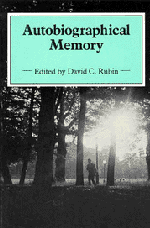Book contents
- Frontmatter
- Contents
- List of contributors
- Preface
- Part I Overview
- Part II Historical, theoretical, and methodological contexts for the study of autobiographical memory
- Part III The general organization of autobiographical memory
- Part IV The temporal organization of autobiographical memory
- Part V Temporal distributions of autobiographical memories
- Part VI Failures of autobiographical memory
- Author index
- Subject index
Part III - The general organization of autobiographical memory
Published online by Cambridge University Press: 01 March 2011
- Frontmatter
- Contents
- List of contributors
- Preface
- Part I Overview
- Part II Historical, theoretical, and methodological contexts for the study of autobiographical memory
- Part III The general organization of autobiographical memory
- Part IV The temporal organization of autobiographical memory
- Part V Temporal distributions of autobiographical memories
- Part VI Failures of autobiographical memory
- Author index
- Subject index
Summary
Some basic observations challenge the researcher trying to understand the structure of autobiographical memory. Autobiographical memory shares properties with all human memory. It is highly organized. It tends to preserve the general gist of events, or series of events, but usually not the details. It is vast, requiring search and decision for retrieval. In addition, autobiographical memory presents problems that memory theorists trying to explain most phenomena can often safely ignore. First, autobiographical memory is memory for a whole lifetime and, as such, memories have much longer times than usual to change, distort, and be reconstructed. Second, this long passage of time is confounded with the development of the rememberer so that a college sophomore may be asked to recall an event encoded by a 6-year-old. Third, autobiographical memory is important affectively. It is the sum of peoples' knowledge of their own lives and as such is the basis for their concept of self.
This section presents diverse approaches to exploring the organization of autobiographical memory. On the one hand, the scope of evidence and theory is widened to include literary criticism of autobiographies, social psychology, personality theory, and development. On the other, the classification of a sample of autobiographical memories is used to specify a model that attempts to define the nebulous term schema in enough detail so that even a machine could understand it.
- Type
- Chapter
- Information
- Autobiographical Memory , pp. 69 - 70Publisher: Cambridge University PressPrint publication year: 1986



